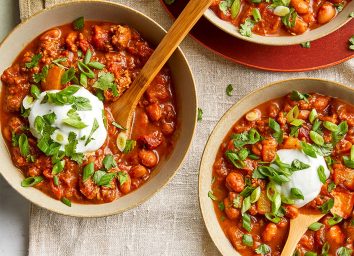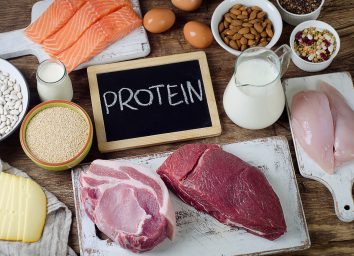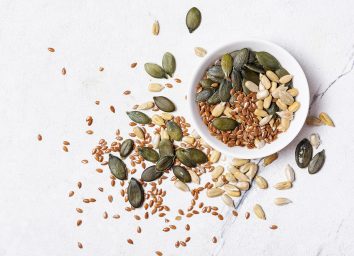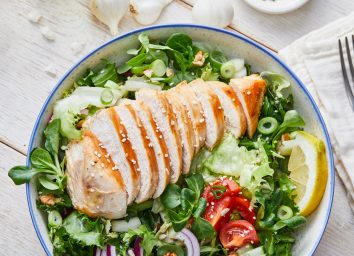
There's no doubt that people love to snack. In fact, over 90% of American adults nibble on at least one snack a day, according to market research published in Nutrients. Of course, there's a very good chance that you tend to find yourself grabbing a few snacks throughout the day. That's why 22% of the average diet of adults in the U.S. is made up of snacky foods. Data found in Physiology & Behavior has also shown that Americans prefer snacks like cookies, crackers, chips, candy, cake, and ice cream, as well as popcorn, nuts, seeds, yogurt, and fruit. Some of these options are obviously healthier than others, with some having more calories and fat, while others are considered low-carb snacks.
Why is that a good thing? Well, along with helping you to manage or lose weight, foods that don't contain an abundance of carbs can also reduce the risk of both type 2 diabetes and heart disease, according to the Mayo Clinic. Granted, that doesn't mean you should cut out all carbs, as they're an important part of a healthy diet.
"Carbohydrates are necessary every day for bodily functioning," says Cheryl Mussatto, MS, RD, LD. "All organs of the body require carbs, and the brain has a strong appetite for this nutrient. Here's an interesting fact: Even though the human brain represents only 2% of our body weight, it uses up to 20% of our daily calories, more than any other organ in the body!"
"Carbohydrates are the main source of energy our body uses to function and it provides glucose, which is our brain's preferred source of energy," says Natalie Gillett, MS, RD. On the other hand, she explains, "While carbohydrates are necessary for proper functioning, too many carbs can lead to weight gain, blood sugar imbalances, and bloating. So, it's important to enjoy the right kinds of carbs in the right amounts. Low-carb snacks can be a great way to get in just enough carbs for an energy boost without overdoing it."
While you may now be eager to find yourself some food that fits the bill, in order to stick to low-carb snacks, it may be helpful to know what exactly qualifies as "low-carb," and some ideas for healthy options.
What is considered a low-carb snack?
"There is no set definition for 'low-carb,' so what is considered low will vary from person to person based on weight, activity, goals, and health conditions," says Gillet. "But in general, a snack containing 15 grams of carbs or less is a good starting point."
Musatto agrees, saying that "A low-carb snack is a food source between 10 to 15 grams of carbohydrates." She also explains, "Since carbs can fill us up quickly, the trick is to include more protein and healthy fat to be paired with a healthy carbohydrate food when choosing a snack. This will keep you feeling fuller longer between meals and will keep blood sugar levels in check."
Of course, you'll want to opt for food that also pleases your palate. Fortunately, we have a range of choices that have just a few carbs but a fair share of tempting tastes that will surely satisfy your snacky cravings.
11 best low-carb snacks
Apples and cheese
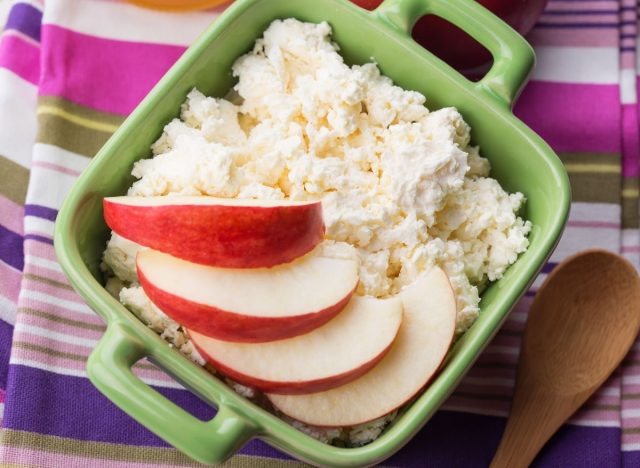
Number of Carbs (per serving)—Apples: 14.8 grams
Number of Carbs (per serving)—Cheese: 4.44 grams
"Combining sweet with salty adds up to a perfect snack," says Mussatto says. To be more specific, she says, "Pair about a cup of apple slices with one ounce of mozzarella cheese, which totals around 16 grams of carbohydrates. This makes a nice combo of protein, fat, and fiber that will be a filling and satisfying snack."
Gillett also suggests snacking on cheese, but mentions cheese sticks as an option, saying, "At only 1 gram of carbs per cheese stick, they are a convenient and portable low-carb snack, plus they provide 8 grams of protein. I recommend adding a small piece of fruit, like an apple or pear, to give you a bit of an energy boost and added nutrients."
Yogurt and cucumbers or berries
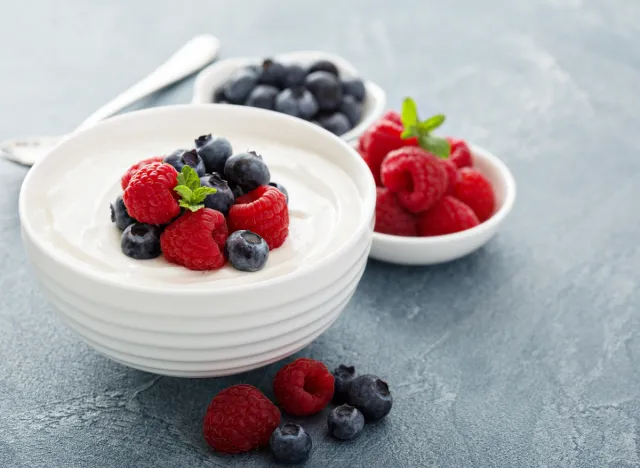
Number of Carbs (per serving)—Greek Yogurt (non-fat): 3.64 grams
Number of Carbs (per serving)—Cucumbers: 2.95 grams
Number of Carbs (per serving)—Strawberries: 7.96 grams
Greek yogurt, cucumbers, and berries—such as strawberries—are all delicious and nutritious. They're also a low-carb option that you can combine in a way that suits your particular preferences. For example, try yogurt and cucumber for a savory treat. Mussatto says, "Here is a more savory pairing of using about a cup of low-fat Greek yogurt for a refreshing creamy dip along with a cup of cucumber slices. This will provide around 10-12 grams of carbs along with an appetite-satisfying protein from the yogurt."
If you don't like cucumbers, then Gillett suggests berries with your Greek yogurt instead, saying, "Greek yogurt is high in protein and contains about 9 grams of carbs per cup. The balance promotes satiety while providing energy. Berries are low in carbs and rich in antioxidants, and will add flavor to your yogurt so you don't need to opt for the sugary, higher-carb varieties."
Cottage cheese with berries
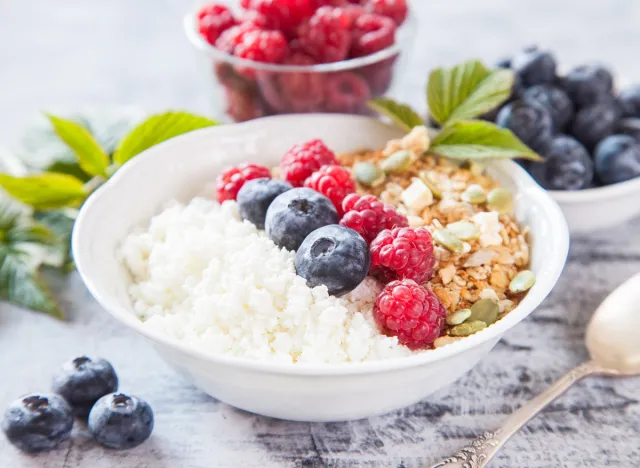
Number of Carbs (per serving)—Cottage cheese (low-fat): 4.31 grams
Number of Carbs (per serving)—Strawberries: 7.96 grams
If you don't have Greek yogurt or just prefer cottage cheese, then the latter is another option to enjoy with berries. Along with being a low-carb snack, there's another delicious reason to opt for this treat.
"Looking for something reminiscent of cheesecake? Try pairing a cup of low-fat cottage cheese with half a cup of a berry of your choice (fresh or frozen)," Mussatto says. "This will be a hunger-squelching desert-like snack with about 17 grams of carbs that provides both protein and gut-friendly fiber."
Gillett explains that "cottage cheese is a low-carb dairy option that is rich in protein and low in fat" while pointing out that you should "choose the reduced-sodium, plain option for your best bet." She also notes that you may want to try it "paired with fruits or vegetables for added flavor and nutrients."
Celery and peanut butter
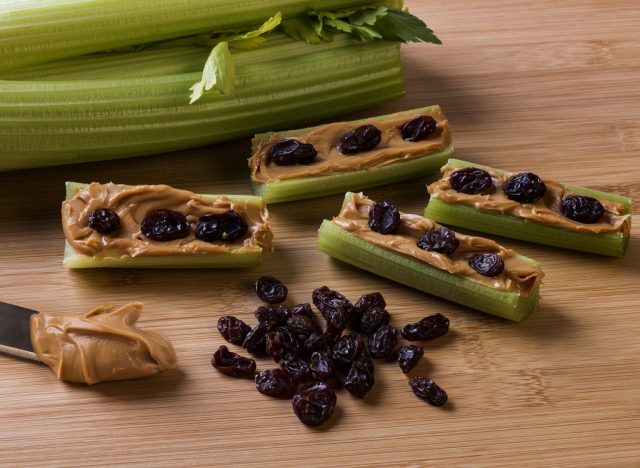
Number of Carbs (per serving)—Celery: 3.32 grams
Number of Carbs (per serving)—All-natural peanut butter: 8 grams
If you're a fan of creamy peanut butter, then you might be interested to find out that a serving contains around 22.7g of carbs. However, both Mussatto and Gillett recommend giving all-natural peanut butter a try due to the fact that it's a relatively low-carb choice.
"Here's a classic snack that truly fits the bill of meeting a 'low-carb' snack," Mussatto says. "The protein and healthy monounsaturated fat from the peanut butter along with celery is a perfect combo for a delicious and satisfying snack."
Gillett explains that all-natural peanut butter "is a good source of healthy fats and some protein, making it a balanced and filling option."
Avocado
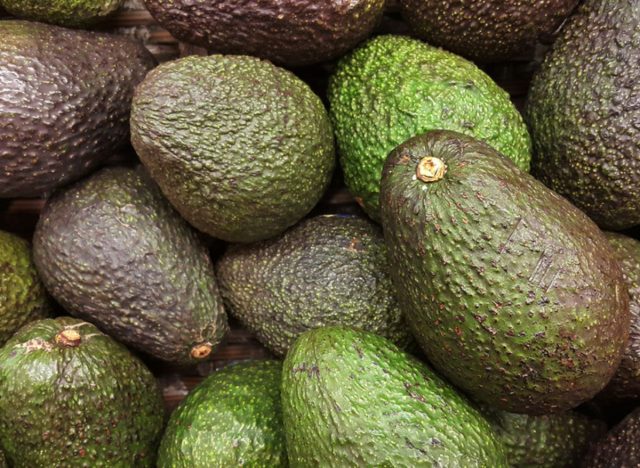
Number of Carbs (per serving)— Avocado: 8.53 grams
Avocados not only offer you a creamy texture and delightful taste, but they also contain vitamins and nutrients that benefit the heart and digestion while helping to prevent depression, bone loss, and even cancer. That's why you may want to enjoy it as a snack in various ways.
"Aside from using it for guacamole, avocados are perfect for spreading on rye crisp bread," Mussatto says. "Mash ¼ cup of a ripe avocado and spread on one crisp bread piece for a crunchy and creamy snack with about 15 grams of carbs. The combo of plenty of fiber and heart-healthy fat is ideal."
Gillett also notes that you can also "slice and top with everything bagel seasoning for a filling snack, or mash it and use veggies to dip."
Edamame
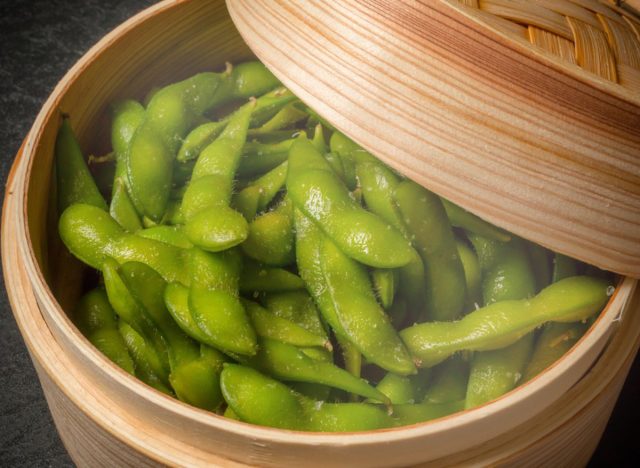
Number of Carbs (per serving)— Edamame: 13.8 grams
"Edamame is rich in protein, fiber, and vitamins, and has about 14 grams of carbs per cup, shelled, making it the perfectly balanced snack," Gillett says.
Although edamame can be a part of various tempting dishes, Gillett notes that when you want to nibble on something healthy in between meals, you can "enjoy them steamed or roasted and top with your favorite season for a satisfying savory snack."
Popcorn
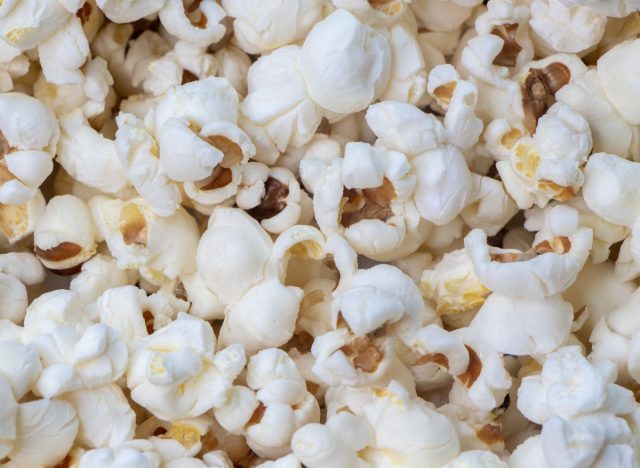
Number of Carbs (per serving)— Popcorn: 15 grams
If you're craving something crunchy, but want a healthy, low-carb snack option, you may want to grab some popcorn. Indeed, Gillett says, "I love popcorn as a low-carb and whole grain snack because you get a nice amount of volume, which is perfect for people who like to munch."
She also points out that "3 cups popped will provide 15 grams of carbs," which puts it at the maximum amount for a low-carb snack. That's why you might want to hold off on adding any extras on top.
Almonds
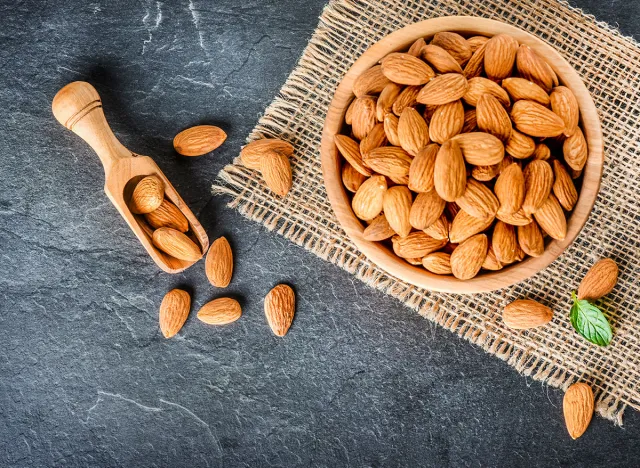
Number of Carbs (per serving)— Almonds: 6 grams
There are nuts that are ideal for anti-aging as well as nuts that can help reduce inflammation and heart disease risk factors. As for almonds, when a review of a large range of randomized controlled trials and additional research was published by Nutrients, the results showed that almonds helped the participants involved lose weight and body fat, while also reducing the risk of being overweight or obese. Almonds also happen to be a fabulous low-carb snack.
"Almonds are nutrient-dense and rich in healthy fats, containing 6 grams of carbs per ¼ cup," Gillett tells us. "Nuts also provide satiety and can help stabilize blood sugar levels."
Hard-boiled egg

Number of Carbs (per serving)— Eggs: 1.12 grams
If you're concerned about cholesterol, then you might be wary of eggs. However, research published in the Journal of the American Heart Association that focused on eggs noted that "[n]o significant association was found between dietary cholesterol intake and heart disease mortality." On top of that, Gillett explains that "hard-boiled eggs are a protein-rich snack with virtually no carbohydrates" and "are an excellent source of high-quality protein."
As for a snack, they're also incredibly convenient. Gillett notes, "It's easy to batch cook them in advance and store them in the fridge so that they're ready when you are."
Tuna
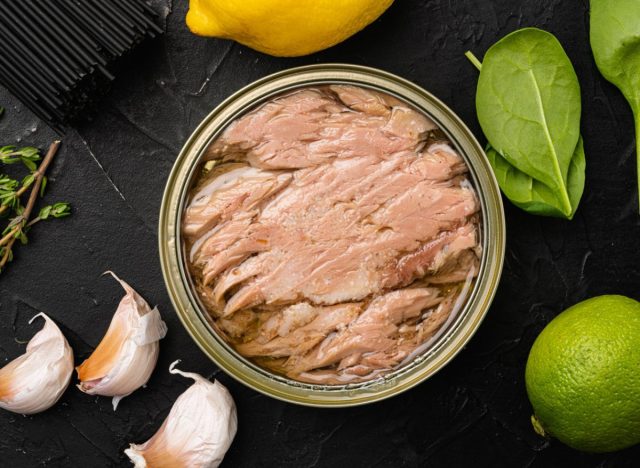
Number of Carbs (per serving)— Tuna: 0 grams
"Tuna is a lean source of protein that is carb-free and is rich in omega-3 fatty acids essential for heart health," Gillett says. That's right, along with tuna being great for your heart and being low-carb, it actually has no carbs at all.
On the other hand, it contains an impressive amount of iron, potassium, vitamin B6, and vitamin B12. That's not to mention the fact that 3 ounces of canned tuna can provide you with around 50% of the recommended daily level of vitamin D your body needs which benefits your bones and immune system.
As for how to eat tuna as a low-carb snack, Gillett tells us it "can be enjoyed on its own, in a lettuce wrap, or mixed with a small amount of mayonnaise or Greek yogurt for added creaminess."
Hummus
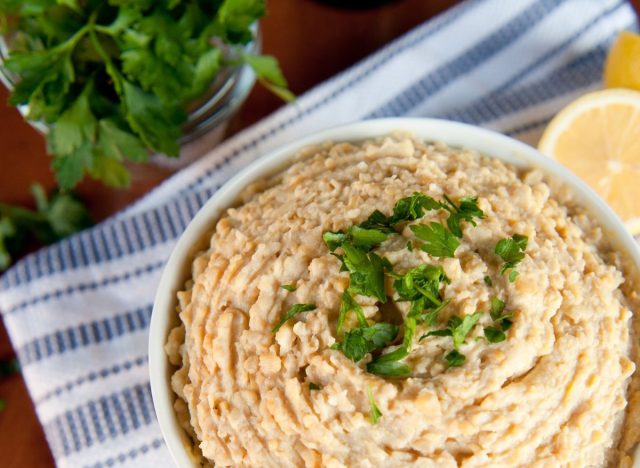
Number of Carbs (per serving)— Hummus: 15 grams
If you love hummus, then you're definitely not alone. The international hummus market was thought to be worth $856.6 million in 2022 and it just continues to grow in value, according to MarketWatch. Undoubtedly popular due to its smooth taste, it's also a low-carb snack that boasts various other perks.
"Hummus, made from chickpeas, provides plant-based protein, dietary fiber, vitamins, and minerals," Gillett says. "It is a low-carb option that offers satiety and a creamy texture. Pairing hummus with fresh vegetable sticks, such as carrots, cucumber, or bell peppers, adds additional fiber, vitamins, and minerals."
- Source: https://www.ncbi.nlm.nih.gov/pmc/articles/PMC10097271/
- Source: https://www.sciencedirect.com/science/article/abs/pii/S0031938418301951/
- Source: https://www.mayoclinic.org/healthy-lifestyle/weight-loss/in-depth/low-carb-diet/art-20045831/
- Source: https://www.ncbi.nlm.nih.gov/books/NBK537084/
- Source: https://fdc.nal.usda.gov/fdc-app.html#/food-details/1750341/nutrients/
- Source: https://fdc.nal.usda.gov/fdc-app.html#/food-details/329370/nutrients/
- Source: https://fdc.nal.usda.gov/fdc-app.html#/food-details/2346406/nutrients/
- Source: https://fdc.nal.usda.gov/fdc-app.html#/food-details/2346409/nutrients/
- Source: https://fdc.nal.usda.gov/fdc-app.html#/food-details/328841/nutrients/
- Source: https://fdc.nal.usda.gov/fdc-app.html#/food-details/2346409/nutrients/
- Source: https://fdc.nal.usda.gov/fdc-app.html#/food-details/2346405/nutrients
- Source: https://fdc.nal.usda.gov/fdc-app.html#/food-details/2262072/nutrients
- Source: https://fdc.nal.usda.gov/fdc-app.html#/food-details/171705/nutrients/
- Source: https://fdc.nal.usda.gov/fdc-app.html#/food-details/168411/nutrients/
- Source: https://fdc.nal.usda.gov/fdc-app.html#/food-details/167959/nutrients/
- Source: https://fdc.nal.usda.gov/fdc-app.html#/food-details/170567/nutrients/
- Source: https://www.ncbi.nlm.nih.gov/pmc/articles/PMC8229803/
- Source: https://fdc.nal.usda.gov/fdc-app.html#/food-details/173424/nutrients/
- Source: https://pubmed.ncbi.nlm.nih.gov/32400247/
- Source: https://fdc.nal.usda.gov/fdc-app.html#/food-details/175158/nutrients/
- Source: https://fdc.nal.usda.gov/fdc-app.html#/food-details/174289/nutrients/

